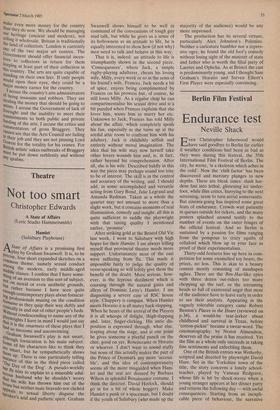Theatre
Not too smart
Christopher Edwards
A State of Affairs (Lyric Studio Hammersmith) Hamlet (Salisbury Playhouse)
AplayState of Affairs is a promising first by Graham Swanwell. It is, to be Precise, four short expanded sketches on a :°11unon theme, namely sexual conduct "Incing the modern, early middle-aged middle classes. I confess that I have some- :ling of an aversion to this sort of subject, rt on moral or even aesthetic grounds, 'In rather because I have seen quite n°ugh contemporary plays about fornicat- ling professionals musing on the condition 7'vine as they quip their way deftly and ,1!lically in and out of other people's beds. ithout condescending to name any of the P„laYwrights I have in mind I would just say at it is the smartness of these plays that I
so tiresome and unconvincing. Graham Swanwell's play is not smart,
alt s "Algh fornication is his main subject. a,?The of his characters like to think they smart, but he sympathetically shows eill uP. There is one particularly telling ,rrnstance of this in the third piece called he Day of the Dog'. A pseudo-worldly flY tries to explain to a miserable adul- tisrfts husband why he shouldn't worry Luat his wife has thrown him out of the rOse but neither male bravado nor cliched 41)Peals to sexual liberty disguise the sPeaker's arid and pathetic spirit. Graham
Swanwell shows himself to be well in command of the conventions of tough guy stud talk, but while he gives us a sense of its hollowness as an attitude to life, he is equally interested to show how (if not why) men need to talk and behave in this way.
That it is, indeed, an attitude to life is triumphantly shown in the second piece, 'Consequences', where Jack, a simple rugby-playing adulterer, cheats his loving wife, Milly, every week or so in the arms of his friend's wife, Frances. Jack needs a bit of spice, enjoys being complimented by Frances on his prowess but, of course, he still loves Milly. As a regular chap he can compartmentalise his sexual drive and is'a bit puzzled when Frances explains that she loves him, wants him to marry her etc. Unknown to Jack, Frances has told Milly about the affair, which completely spoils his fun, especially as she turns up at the sordid attic room to confront him with his adultery. Jack is childishly selfish and entirely without moral imagination. The idea that his wife may now herself take other lovers wounds him and, is, in fact, rather beyond his comprehension. After all, she is his wife. Described baldly in this way the piece may perhaps sound too trite to be of interest. The skill is in the control and accuracy of the writing, and, I should add, in some accomplished and versatile acting from Gary Bond, Julie Legrand and Amanda Redman. Taken as a whole the quartet may not amount to more than a slight work, but it contains moments of real illumination, comedy and insight; all this is quite sufficient to saddle the playwright with that taxing quality I mentioned earlier, 'promise'.
After striking gold at the Bristol Old Vic last week, I went to Salisbury with high hopes for their Hamlet. I am always telling myself that provincial theatre needs more support. Unfortunately most of the cast were suffering from flu. This made it impossible fairly to judge the quality of verse-speaking so will loftily give them the benefit of the doubt. More serious, how- ever, is the leprous distilment which is coursing through the natural gates and alleys of Dominic Letts's Hamlet. I am diagnosing a severe case of RSC house style. Chappery is rampant. When Hamlet meets Horatio it is all matey back-slapping. When he hears of the arrival of the Players it is all whoops of delight, thigh-slapping and, later, finger-clicking. His antic dis- position is expressed through, what else, leaping about the stage, and at one point he gives someone a playful punch on the chin; good on yer, Rosencrantz or Horatio or whoever. I don't want to sound stuffy but none of this actually makes the part of the Prince of Denmark any more 'accessi- ble', and this idea of contemporaneity seems all the more misguided when Ham- let and the rest are dressed by Barbara Wilson in splendid Renaissance costume. I think the director, David Horlock, should go in for a bit of whole hoggery. Make Hamlet a punk or a spaceman, but I doubt if the youth of Salisbury (who made up the
majority of the audience) would be any more impressed.
The production has its several virtues, particularly Alex Johnston's Polonius. Neither a caricature bumbler nor a repres- sive ogre, he found the old fool's comedy without losing sight of the minister of state and father who is worth the filial piety of Laertes and Ophelia. As at Bristol the cast is predominantly young, and I thought Sam Graham's Horatio and Steven Elliott's First Player were especially convincing.














































 Previous page
Previous page